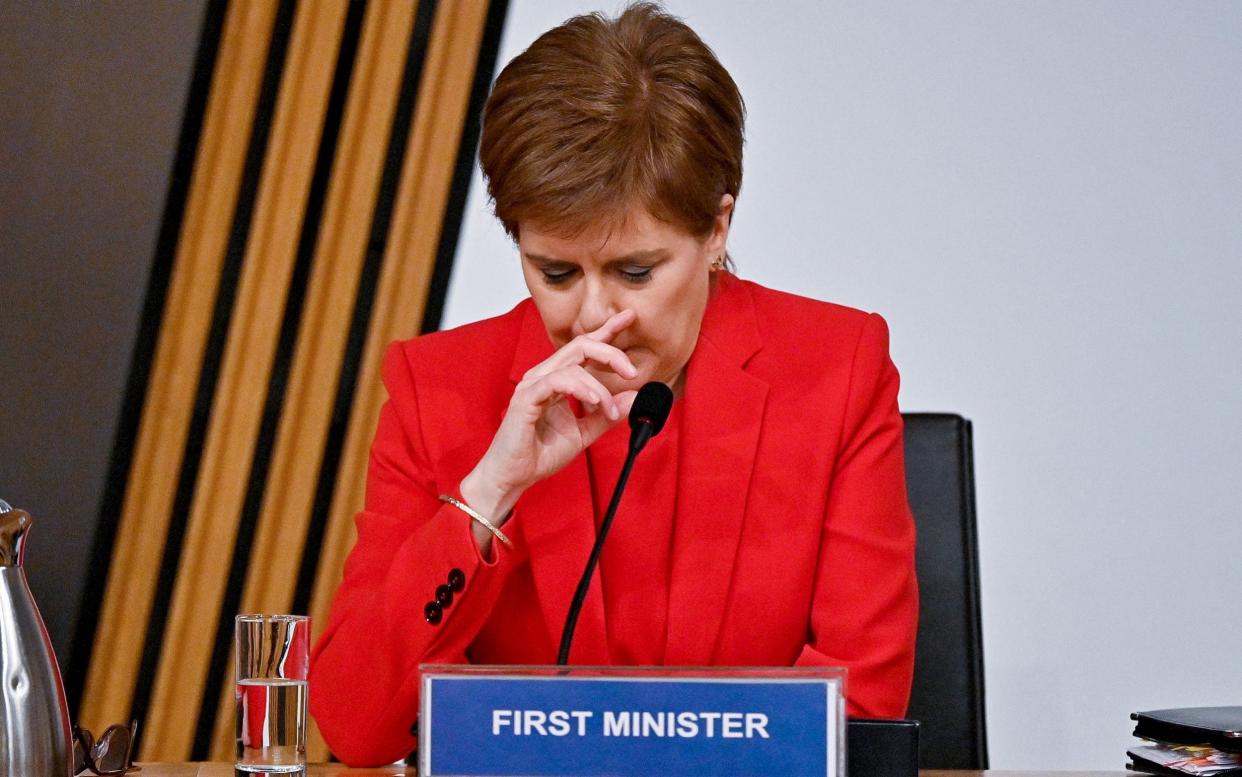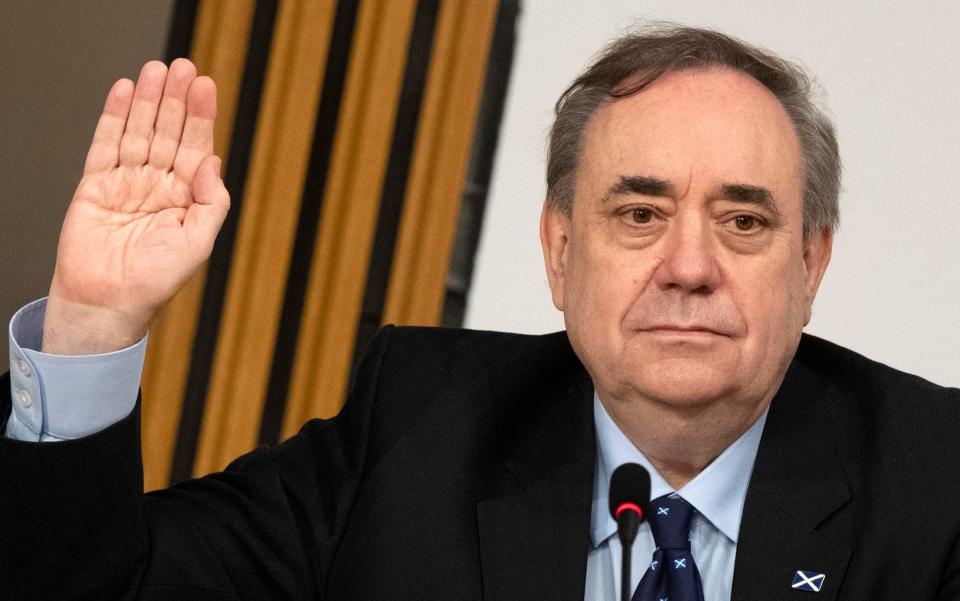Nicola Sturgeon chokes back tears as she rejects 'absurd' claims she was out to destroy Alex Salmond

Nicola Sturgeon choked back tears and insisted "I would never have wanted to 'get' Alex Salmond" as she rejected as "absurd" his claims of a plot among senior SNP figures to destroy him.
The First Minister told a Holyrood inquiry the "simple" truth was that several women made complaints about Mr Salmond's behaviour and "I refused to follow the usual pattern of allowing a powerful man to use his status and connections to get what he wants."
In an appearance spanning more than eight hours, against the backdrop of calls for her resignation, Ms Sturgeon insisted she had seen "nothing that comes within a million miles" of backing Mr Salmond's conspiracy claims.
Although she reiterated it was "beyond question" that Mr Salmond had been cleared of all criminal charges, she said his behaviour was still "deeply inappropriate" and "there was not a single word of regret" from him during his six hours of testimony last week.
Ms Sturgeon appeared on the verge of tears, with her voice breaking, as she was invited to apologise to the Scottish people for arguing for years they could trust Mr Salmond to take them to independence.
Murdo Fraser, a Tory MSP, pressed her when she had decided he "was no longer the Charles Stewart Parnell of Scotland, and was in fact a liar and a fantasist?’"
Admitting she had to to "rethink certain things" about him, she said: "As I was watching him on Friday lashing out against us, I don't know whether he ever reflects on the fact many of us, including me, feel very let down by him. That's a matter of deep personal pain and regret for me."
But she faced a litany of allegations she had broken the ministerial code - normally a resignation matter - after two witnesses corroborated key parts of Mr Salmond's account.
Ms Sturgeon also admitted that people would struggle to understand parts of testimony, including forgetting a meeting on March 29, 2018 at which she was informed about sexual misconduct claims against him. She also said it would be "hard" for the public to comprehend her claim she did not discuss the allegations with Peter Murrell, her husband and the SNP's chief executive, before Mr Salmond came to their home.
As she was giving evidence on Wednesday, Mr Salmond announced he had lodged a formal complaint about a Scottish Government official who allegedly leaked the name of a woman who made allegations against him.
Ms Sturgeon's spokesman claimed she had "dismantled" all the allegations levelled at her but Jackie Baillie, a Labour committee member, highlighted missing Scottish Government legal advice and the First Minister's failure to refute key claims "corroborated by several sources."
She said: "Ultimately, the First Minister was unable to answer accusations made against her, unable to disprove claims made by credible witnesses, and unable to properly defend the government’s costly decision to persist with the judicial review. Serious questions remain over the First Minister’s conduct.”
Douglas Ross, the Scottish Tory leader, said: "The abiding memory of this evidence session will be Nicola Sturgeon proclaiming "I can't recall" on repeat. She dodged and evaded almost every difficult question.
"It's not remotely credible, in fact it's plainly absurd, for the First Minister to ask us to believe her account of a secret meeting that she claims to have forgotten entirely, instead of the evidence of multiple credible witnesses."
In her opening statement, Ms Sturgeon admitted her government made a "very serious mistake" when investigating sexual misconduct complaints against her predecessor and mentor, and apologised to two female civil servants who lodged complaints.
She told the committee: “Alex spoke on Friday about what a nightmare the last couple of years have been for him, and I don’t doubt that. I have thought often about the impact on him.
“He was someone I cared about for a long time. Maybe that’s why on Friday I found myself searching for any sign, any sign at all, that he recognised how difficult this had been for others too - first and foremost for women who believed his behaviour towards them was inappropriate.
“But also for those of us who have campaigned with him, worked with him, cared for him and considered him a friend, and who now stand unfairly accused of plotting against him.”
She said she wanted to "rebut the absurd suggestion that anyone acted with malice" and claimed her government had "tried to do the right thing" despite bungling its investigation.
Messages have emerged from Peter Murrell, Ms Sturgeon's husband and the SNP's chief executive, in which he said it was a "good time to be pressurising" police to investigate Mr Salmond.
However, she insisted this had been taken out of context and the full message gives a "very, very different impression." She said the messages were between people cooperating with police inquiries and supporting one other.
She added: "I have seen nothing that comes within a million miles of backing up that central assertion Alex was making, that there was some kind of coordinated attempt."
Ms Sturgeon insisted she was “never aware” of any allegations of sexual misconduct against Mr Salmond until November 2017, when Sky News approached the SNP with a media inquiry about an alleged incident at Edinburgh Airport in 2009.
Although Sky did not run a story, she said it had left her with “a sense of unease” that the claim had “poked a hornets nest” and a "lingering suspicion" more allegations may emerge.
However, she denied her government had decided to create a "bespoke Alex Salmond policy" by drawing up a new harassment complaints procedure that included former ministers for the first time, at around the same time the first civil servant raised concerns.
Mr Salmond won a judicial review in 2019 when Scotland’s highest civil court found that the way the Scottish Government investigated sexual misconduct allegations against him was unlawful.
The SNP administration he once led paid him £512,250 of taxpayers' money to cover his legal costs after the judge Lord Pentland ruled the inquiry was "procedurally unfair" and "tainted with apparent bias".
The case was abandoned on the eve of a Court of Session hearing after the government admitted it had breached its own guidelines by appointing an investigating officer who had “prior involvement” with two civil servants who had made complaints.
The committee’s inquiry into the debacle was kickstarted after when Mr Salmond was acquitted of sexual assault charges at the High Court last year.
Ms Sturgeon today denied one of her officials had named a complainant in a meeting with Geoff Aberdein, Mr Salmond's chief of staff, in March 2018.
But Mr Aberdein's claim has been corroborated by Kevin Pringle, the SNP's former chief spin doctor, and Duncan Hamilton, a former MSP and advocate. He said Mr Aberdein informed the pair of the identity in a conference call after the meeting.
Ms Sturgeon said on Wednesday: "I am not accepting that that happened, therefore I am clearly not accepting that was authorised."
She argued that Mr Salmond knew of the identity of one of the two women who had come forward as he had previously apologised to her for his behaviour. Although she admitted he also knew the identity of the second woman when they met at her home, she claimed he may have gleaned this from scouring the Scottish Government's social media accounts.
Ms Sturgeon said she had not ordered a police investigation into the leak as she wanted to respect the committee's inquiry. She also insisted she did not know who leaked details of the allegations to the Daily Record and they were not acting with her authority.
Mr Fraser pointed out Mr Aberdein's version of events was corroborated by both Mr Hamilton and Mr Pringle, whereas her official's statement was not supported by anyone else. However, Ms Sturgeon suggested that the inquiry interview both Mr Aberdein and the official in private.
Mr Salmond was last week adamant Ms Sturgeon knew about the allegations at a meeting with Mr Aberdeen in her parliamentary office on March 29, 2018. This was also corroborated by both Mr Pringle and Mr Hamilton.
He pointed out he would not "pop in" to her Glasgow home four days later - the meeting where Ms Sturgeon claims she first found out about her government's investigation - as he lives 200 miles away in Aberdeenshire.
Ms Sturgeon has claimed she "forgot" about the March 29 talks despite the explosive content. On Wednesday she said she recognised how "unlikely" it sounded that this meeting had slipped her memory.
Describing how Mr Salmond handed her a letter at the second meeting about her government's investigation, she said: "It was the detail of the complaints under the procedure that I was given on April 2, that was significant, and indeed shocking.
"That was the moment at which any suspicions I had or general awareness that there was a problem, became actual and detailed knowledge."
Ms Sturgeon insisted that she initially thought the meeting at her home was party business, not government, as Mr Aberdein told her that Mr Salmond was considering resigning from the SNP. He vehemently denied this last week.

She said it became apparent during the talks it was government business. The ministerial code requires this to be recorded and officials to be informed, which Ms Sturgeon did not do until June that year. Ms Sturgeon claimed that informing the civil service of her dealings with Mr Salmond could have been perceived as trying to influence the investigation and could have compromised its confidentiality.
However, Ms Baillie said the code did not provide any discretion and officials should have been informed. A separate investigation into the ministerial code breaches is due to report back shortly.
Mr Hamilton was present at the April 2 meeting at her home and confirmed she "did offer to assist" Mr Salmond with her government's investigation, only to change her mind. His written evidence to the committee said: "My clear recollection is that her words were 'If it comes to it, I will intervene'."
On Wednesday, Ms Sturgeon did not dispute she may have used this language but said that "crucially" she had not stepped in. She admitted she may have given him the impression she would step in to help him because she was trying to “let a long-standing friend and colleague down gently".
A spokesman for Mr Salmond said he "has lodged a formal complaint with the Permanent Secretary to the Scottish Government under the civil service code, on the conduct of the official who is alleged to have breached civil service rules, by disclosing the name of a complainant in the Scottish Government process."
A spokesman for Ms Sturgeon said: "The First Minister today dismantled all of the claims which have been made against her. In fully eight hours of evidence, the opposition completely failed to substantiate any of the allegations and absurd conspiracy theories which have been levelled at her and her office in this case."

 Yahoo News
Yahoo News 
